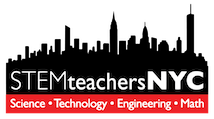Leader: Steve Lewis (Heschel School)
Would you like to teach your students some real engineering and computer programming in the context of your science course? Here’s a great way to do it! Make your existing course better without learning a whole new curriculum! Do the same, required experiments, but with an exciting, easy-to-learn new twist!
You’ll learn how to use an inexpensive module and some pre-cooked programming blocks in Scratch to collect data in real time – a dynamic activity that kids will love. You’ll find out how to get kids engaged in computer programming in Scratch, developing their ideas for experiments, as well as their own data collection strategies and techniques.
Have little or no experience with programming? That’s OK. You can use our pre-cooked routines, and we’ll show you how to program your own.
Do you already have a basic understanding and familiarity with Scratch, Python or other coding languages? This workshop is still for you! You’ll learn to use simple equipment, an array of sensors, and the Make!Sense interface board. You’ll find out how to add the vital skills of basic coding to your courses while continuing to focus on the key science content you teach.
For more information visit Make!Sense’s website: www.makesense.co (not “.com”); check out the section entitled Make!Science for some great examples of how it is being used in classrooms.
Make!Sense interface boards and sensors will be provided at the workshop for all participants, and you can purchase them after the workshop if you wish. When you register for the workshop, you are encouraged to buy one Make!Sense kit at the special workshop price; the kit includes a variety of sensors and ensures that you will leave the workshop with everything you need to apply what you have learned in your own classroom. You should also bring a laptop with a USB port to the workshop so you can practice collecting data with your own machine.
Don’t miss this opportunity to get in on the fun of the growing movement to enliven science courses with an up-to-date approach to data collection and experimentation!

